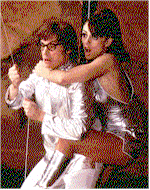|
| |
Austin Powers: International Man of Mystery
Review by Carrie
Gorringe
 |
|
Directed by Jay Roach
Starring Mike Myers,
Elizabeth Hurley, Michael York,
Mimi Rogers, and Robert Wagner
Screenplay by Mike Myers |
Question: What do you get when
you combine a scene concerning criminal enterprise (not to mention a criminal mastermind)
from Thunderball, a control room for this enterprise straight from You Only Live
Twice, a setting for the main action from Diamonds Are Forever, several
entr’actes featuring a flower-power band and lots of zooms from Laugh In, add
a dollop of improbability (our eponymous hero utilizes cryogenic technology to transport
him from the Swinging London of ’67 to the even more garish and vulgar Las Vegas of
’97 in lukewarm pursuit of the villain) and process thoroughly in a Cuisinart of
ironic self-consciousness? Answer: Your guess is as good as mine, and the guess, however
riddled with faults, will probably be better than the film Austin Powers.
 The outcome of Austin Powers should stand as a warning to
anyone who thinks that either the ‘60s or the spy films made therein are ripe objects
for satire. Even the spoofs of James Bond films made during that time (the limp and dismal
Matt Helm series starring Dean Martin, or the better Flint series with James
Coburn) could never get the mix of seriousness and tongue-in-cheek humor quite right. The
main target, as the appropriations list above makes clear, was, of course, the Bond film.
Unfortunately for the satirical also-rans, the best of the Bond films had the talents of
writers like Richard Maibaum, and seasoned action directors such as Terence Young and Guy
Hamilton on board; these individuals were able to recognize the elements that made Ian
Fleming’s books so eminently suited for big-screen adaptation: aside from simple but
stylish narratives, the books were saturated with a deep strain of coldly sardonic wit,
making them ideal entertainment vehicles for the iconoclastic 1960s, when the emotional
detachment so common in Fleming’s set inundated popular culture. The existence of
reactionary tendencies in these novels – such as the confinement of women in the
narrowly-defined roles of either sex object or secretary – so often a topic of
discontent for modern commentators, was beside the point; This was a fantasy world which,
as so many like it, was constructed in extremes, meaning that ambiguities and compromises
had to be parked at the door before admission. These same qualities made the works
attractive and, when transferred to the films, also has the (perhaps) unintentional effect
of rendering them impermeable to imitation without making the imitator seem absolutely
superfluous. The outcome of Austin Powers should stand as a warning to
anyone who thinks that either the ‘60s or the spy films made therein are ripe objects
for satire. Even the spoofs of James Bond films made during that time (the limp and dismal
Matt Helm series starring Dean Martin, or the better Flint series with James
Coburn) could never get the mix of seriousness and tongue-in-cheek humor quite right. The
main target, as the appropriations list above makes clear, was, of course, the Bond film.
Unfortunately for the satirical also-rans, the best of the Bond films had the talents of
writers like Richard Maibaum, and seasoned action directors such as Terence Young and Guy
Hamilton on board; these individuals were able to recognize the elements that made Ian
Fleming’s books so eminently suited for big-screen adaptation: aside from simple but
stylish narratives, the books were saturated with a deep strain of coldly sardonic wit,
making them ideal entertainment vehicles for the iconoclastic 1960s, when the emotional
detachment so common in Fleming’s set inundated popular culture. The existence of
reactionary tendencies in these novels – such as the confinement of women in the
narrowly-defined roles of either sex object or secretary – so often a topic of
discontent for modern commentators, was beside the point; This was a fantasy world which,
as so many like it, was constructed in extremes, meaning that ambiguities and compromises
had to be parked at the door before admission. These same qualities made the works
attractive and, when transferred to the films, also has the (perhaps) unintentional effect
of rendering them impermeable to imitation without making the imitator seem absolutely
superfluous.
 To
be fair, the first ten minutes of Austin Powers are quite entertaining, because the
attention to detail the filmmakers employed is remarkable in capturing the fatuousness of
the 1960s. Throw in the anachronistic gimmick, however, and suddenly things don’t
seem quite as amusing when Austin finds himself in the ‘90s. This concept would have
made a great skit for an episode of Saturday Night Live, as SNL alumnus
Myers is no doubt aware, and, if it hadn’t lasted an hour and twenty minutes longer
than if should have, its promise would have been maintained. Myers, however, doesn’t
know how to go beyond satirizing appearances, and chooses instead to fall back upon a
reliance of the audience’s recollections of the bouquet of borrowed scenes in their
original forms as a means of driving the narrative forward. He is, in short, asking the
audience to do the work for him, without his having to go to the trouble of providing
anything unique for the audience to consider. Under the circumstances, there can be no
surprise as to the film’s outcome: stale caricatures, like Myers in his dual role as
toothy hero and follically-challenged villain, and Robert Wagner’s feeble attempts to
replicate Adolfo Celi’s evil characterization from Thunderball simply become
painfully unfunny, while a buffoon like Tom Arnold can achieve the unthinkable and
actually steal a scene out from under Myers. Fortunately for Mimi Rogers, Myers was kind
enough to provide her with as little screen time as possible, so that she can claim almost
no association with this film at all. Not so poor Elizabeth Hurley, whose comedic timing
frequently falls far short of the mark; her best performance comes during the final
credits when she plays Veruschka to Myers’ David Hemmings a la Blow-Up, and
may be the most telling illustration of her real talent (selling cosmetics rather than
selling lines). No, friends, this Austin Powers just doesn’t make the scene. To
be fair, the first ten minutes of Austin Powers are quite entertaining, because the
attention to detail the filmmakers employed is remarkable in capturing the fatuousness of
the 1960s. Throw in the anachronistic gimmick, however, and suddenly things don’t
seem quite as amusing when Austin finds himself in the ‘90s. This concept would have
made a great skit for an episode of Saturday Night Live, as SNL alumnus
Myers is no doubt aware, and, if it hadn’t lasted an hour and twenty minutes longer
than if should have, its promise would have been maintained. Myers, however, doesn’t
know how to go beyond satirizing appearances, and chooses instead to fall back upon a
reliance of the audience’s recollections of the bouquet of borrowed scenes in their
original forms as a means of driving the narrative forward. He is, in short, asking the
audience to do the work for him, without his having to go to the trouble of providing
anything unique for the audience to consider. Under the circumstances, there can be no
surprise as to the film’s outcome: stale caricatures, like Myers in his dual role as
toothy hero and follically-challenged villain, and Robert Wagner’s feeble attempts to
replicate Adolfo Celi’s evil characterization from Thunderball simply become
painfully unfunny, while a buffoon like Tom Arnold can achieve the unthinkable and
actually steal a scene out from under Myers. Fortunately for Mimi Rogers, Myers was kind
enough to provide her with as little screen time as possible, so that she can claim almost
no association with this film at all. Not so poor Elizabeth Hurley, whose comedic timing
frequently falls far short of the mark; her best performance comes during the final
credits when she plays Veruschka to Myers’ David Hemmings a la Blow-Up, and
may be the most telling illustration of her real talent (selling cosmetics rather than
selling lines). No, friends, this Austin Powers just doesn’t make the scene.
Contents | Features
| Reviews | Books | Archives | Store
Copyright © 1999 by Nitrate Productions, Inc. All Rights
Reserved.
| |
|